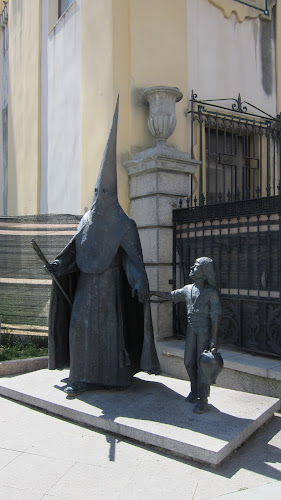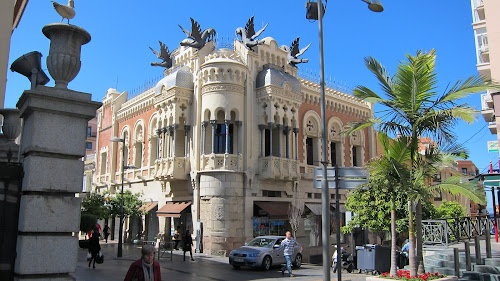Today I pointed my trusty mechanical steed towards Africa; Ceuta to be precise. Ceuta is an enclave of Spain in Africa, as is Melilla, another remote city. Access is by boat or air. Boat is the far more common route, and this comes in two flavours, both regular boat, and high speed "flying" boats. The latter takes just 35 minutes to make the crossing, but doesn't normally allow bicycles. In my case, upon arriving at the ticket office, and as I only had a few minutes before the boat left, I assured the very helpful ticket lady that by the time I boarded, the bike would be folded into its soft-covered case, and thus no long a bicycle as much as a large shoulder bag. The fine ship Alboran is run by Acciona Transmediteranea, a company out of Catalunya. I mention this because after the safety video was played in Spanish (exits,lifejackets, etc.) the entire thing was replayed in Catalan, which must really go over well here. I noticed that the other competing line doing this run is called Lineas Baleares, so it's pretty much one stop shopping in that respect.
Ceuta, and Melilla, as might be expected, are "Africa lite", which is to say, Africa as administered by Europeans. To put not too fine a point on it, it's clean, the rule of law is respected, and women aren't treated like cattle. As also might be expected, the borders which separate the enclaves from Morocco are also heavily fenced and guarded, so great is the pressure to escape the crushing poverty and despair of Morocco and nations further south. Crude rafts and boats filled with African "refugees" are regularly intercepted in Spanish waters by the Coast Guard. After medically treating the survivors, they are flown back to where they came from, all courtesy of the Spanish tax payer. While I might seem unsympathetic, it is hardly the responsibility of Spain to make up for the corruption, incompetence, and shameless embezzlement typical of most African states.
My lack of sympathy is further aggravated by the fact that Catalunya already supports it's own share of the indolent and useless, namely, all of Andalucia. To add insult to injury, while Catalunya is hard-pressed to make painful cuts to services and infrastructure, no such cuts are occurring in Andalucia, despite the fact they are net beneficiaries of the transfer payment setup. Currently the campaign for regional elections in Andalusia is on, and the current socialist party is likely going to lose handily to the PP, a right wing party that has ties with the fascist Falange, and by association, the Catholic church. The radio adverts are pathetic, typically playing up regionalism in their interview sound bites: "Johh thoieee Andaluthhhh, y noh thoieee Thothialistah y nuncah vot-hareh Thothialistah". Yeah, well, just go back to leaching off welfare, playing guitar and murdering bulls there Paco. Such is the state of Spanish politics that it oscillates from the far left to the far right, so that any progress which is made by one side is quickly undone by the next. It is not surprising that everyone I talk to in Catalunya desperately wants to separate themselves from these blockheads. But in my ranting, I digress...
Morocco has applied many times for the "return" of both enclaves, which is rather hilarious since both cities have been administered since Roman times as part of the province of Hispania, two millennia before there was even the idea of such a place as Morocco. The word "return" does not apply here quite as much as the more familiar "gimme-gimme". As is typical of all diplomatic negotiations between Spain and Morocco, the response has been a polite, cheerful, but firm invitation to "fuck right off". Both cities are very much European-style in flavor and structure, with excellent upkeep and regulation, and are very unlike the tawdry, crumbling warrens of narrow, dark alleys and piles of garbage which are the signature trademarks of most North African slums rather generously referred to as towns.
My motive for visiting today is two-fold: first, I've never been here and it's a remote enough place that it seems worth a visit. The second is to get my credential stamped at the cathedral of Ceuta, as I start the first leg of my Via de la Plata pilgrimage to Santiago de Compostela. People have started their pilgrimage routes from all over Europe, Chartres is a strong second after Saint-Jean-Pied-de-Port, where most people begin the Camino Frances. I met a couple last time that had started in Amsterdam and had cycled to Compostela, probably for most Dutch people, not even raising a sweat. My thinking is that those who complete the Camino having started in Africa are rather rare, so all the more reason to start here. I wonder what the pilgrimage office in Santiago will make of this...
My impressions of Ceuta is that it is like any other modern southern Spanish city (anything south of the Ebro is "southern") which lacks for nothing despite its remote location. I have appended a link at the end with further pictures. Quite apparent is the fact that a large part of its population is Muslim, as most women wear the traditional head scarf (remember, it is their choice and they do it voluntarily...). This of course brings with it all the baggage which I don't even want to consider, sharia, genital mutilation, lack of social standing, little opportunity for education, etc. etc. etc. the usual things that are swept under the rug by the cultural relativists and other self-loathing Useful Idiots.
The city itself is very clean and efficient, and I had most of the day to wander before taking the last ferry back to Algeciras. There are no bicycle paths to speak of, though there is little traffic once out of the downtown core which is pedestrian only, but more worrying was the fact that there were no bicycle lock-ups; very rare for a Spanish city. I locked my bike to the grill at the cathedral, and I did not spend any time inside past getting my credential stamped. There were various random sketchy characters outside observing me, and again, it pains me to say, they were all Muslims. I put both locks on, took off the seat, the pedals, and my handbag, but I still felt pretty uneasy about leaving it there: the unfortunate part of the Montague is that it attracts far too much attention. There seem to be few cyclists in Ceuta, I saw only two other riders, both Muslims judging by their cloaks and headgear, and they were riding very beat-up bikes.
On returning to the port, there was another twist; they required everyone to pass through a metal detector and x-ray their luggage before boarding the ship; this was not required this morning when leaving the mainland... Things that make you go hmmmmmm... Naturally they wanted to X-ray the bike, which was no big deal, I just folded it up again and put it on the belt. This caused much amazement on the part of the security crew, and they had lots of questions which I tried to answer quickly, but they apparently had little regard for holding up the rest of the line-up. We all stared at the x-ray of the bicycle as I answered all sorts of questions. The ironic thing about all of this is that little of the original bicycle remains, apart from the frame itself. Since the last Camino trip, I have upgraded the entire running gear, the head stem, the handlebars, the back wheel, and the seat. Most of the components are now of various German makes, though the seat is English, the locking skewers are French, and the spokes are Swiss. Aside from the frame, the bicycle is more European than American, so the components should be rather more familiar to these connoisseurs than they are to North Americans, since I had to directly import most of these parts myself from Europe. I guess the unique folding frame is what intrigues them.
PS: I did eventually get my stamp; Holy Mary of Africa!
Some further pictures:
Link to pictures with annotations!











No comments:
Post a Comment